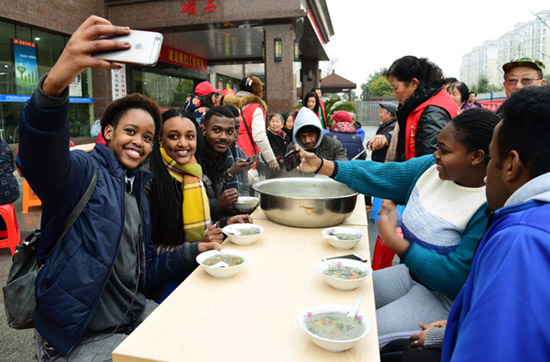University finds its own path in international education
(english.jsjyt.gov.cn) Updated:2018-07-16

Students from Pakistan, Jamaica and Ethiopia studying at Jiangsu University take selfies over a meal of Laba congee in Zhenjiang, Jiangsu province, Jan 22. [Photo/Xinhua]
Jiangsu University's international education has flourished in recent years, with the number of overseas students reaching 2,580 in 2017, a remarkably high number among local higher learning institutions.
Cultural convergence has helped the school succeed. "We have created an immersive environment combining local culture with language teaching, and providing overseas students with a better understanding of China's culture, development and social practices," said Gao Jing, director of the school's Overseas Education College.
The school also encourages Chinese students to study full-time alongside international students, providing more than 700 courses from 14 majors in English.
"All master's and doctoral programs are open to foreign students able to take classes in English," Gao noted.
Numerous students have benefited from the school's unique atmosphere. Siwathep Singh Khanderpor of Thailand said he seizes every opportunity to converse with his Chinese friends, improving his Chinese language skills and introducing him to deeper elements of Chinese culture.
Natalie Mupfumira from Zimbabwe, who speaks nine languages and shows excellent fluency in Chinese, used her skills to help both Chinese and foreign students with their language studies.
Along with such cultural convergence, Jiangsu University is also striving to sharpen the students' expertise in specific areas, Ghanaian doctoral student Oppong Paul Kwabena being one example. Kwabena majored in agricultural engineering, intending to "sow" his knowledge in the fields of his home country.
"Africa does not invest much in agricultural modernization, especially in product processing and industrial development," Kwabena said.
Along with a friend, the young Ghanaian student led a series of research projects on the agricultural modernization demands of countries involved in the Belt and Road Initiative, garnered support from the agricultural departments of related countries, and developed their very first report on the agricultural status of Ghana and Pakistan.
Jiangsu University president, Yan Xiaohong, said the school is continually moving toward further excellence for its international students.
Twenty-nine students from Belt and Road countries are now engaged in the school's fluid machinery and engineering program, one of its most important and influential disciplines. Industrial parks from Russia and Thailand joined with the school to create tailored training programs.
Along with extending educational benefits to foreign industries, Jiangsu University has also developed methods of helping local companies acclimate to overseas markets.
Cultivating students with a masterful understanding of industrial rules and regulations both in China and overseas has resulted in the most fruitful results for the school.
Chirag Kukadiya, an Indian alumnus, helped a local optical cable company to overcome a domestic development predicament and extend its business reach into India.
More than 30 foreign postgraduates have participated in and been awarded by a variety international conferences.
"While students' familiarity with industries in their home country is one elemental quality, their understanding and acceptance of Chinese standards is definitely an added benefit," said school president, Yan Xiaohong.
